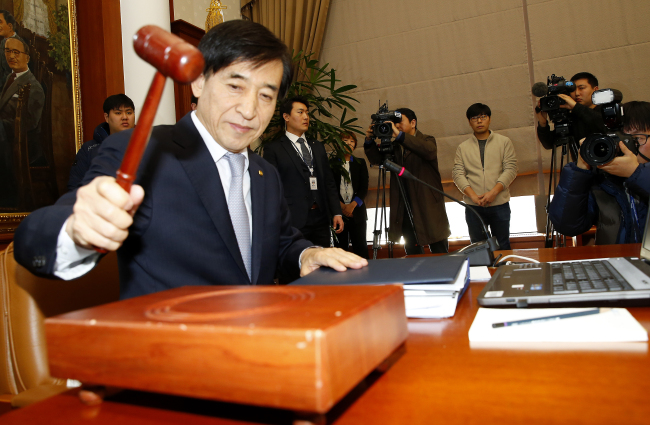South Korea’s central bank lowered its economic growth forecast for 2016 and kept the base rate unchanged Thursday, citing rising global uncertainties, household debt and slumping oil prices.
The Bank of Korea’s monetary policy board lowered the growth outlook for Asia’s fourth-largest economy to 3 percent from 3.2 percent three months earlier.
“(Korea’s) domestic demand and consumption are showing signs of improvement, yet the pace is slowing down due to the delayed recovery in global demand,” BOK deputy governor Suh Young-kyung said in a press briefing.
In addition, the central bank picked the slowing growth in emerging countries, most notably China, and increasing level of risks at home and abroad, and slowing domestic growth potential due to delays in structural reforms.
 |
| Bank of Korea Gov. Lee Ju-yeol opens a policy meeting at the bank‘s headquarters in downtown Seoul on Thursday. (Yonhap) |
The BOK estimated consumer prices to jump 1.4 percent in 2016, far below its mid-term goal of 2 percent, citing slow domestic demand and record-low global oil prices. It expects the low oil price levels to continue throughout the year, approximately $39 in the first half of 2016 and $49 in the latter half.
The BOK estimated the country’s gross domestic production growth at 3.1 percent in the first half of 2016, 2.9 percent in the latter half and 3.2 percent in 2017.
It forecast that the current account surplus to GDP ratio will fall from the hight-7 percent in 2015 to near-7 percent in 2016 and mid-5 percent in 2017. The size of current account surplus, estimated at $98 billion in 2016, may decline depending on the magnitude of rise in oil prices.
Regarding widespread criticism that the BOK’s optimism in growth forecast still exceeds those of private agencies, BOK Gov. Lee Ju-yeol showed confidence in Korea’s potential.
“The International Monetary Fund and other global economic institutions generally agree on Korea’s high potential of growth and its improving export conditions,” Lee said, stressing that “the 3 percent forecast cannot be too optimistic, considering the 2.6 percent growth of last year.”
Earlier in the day, the BOK Monetary Policy Committee froze the monthly base interest rate at a record-low 1.5 percent, citing soaring household debt, volatility in China and low crude prices.
The BOK said it decided to keep the key rate unchanged largely due to the nation’s skyrocketing household debt.
As of Sept. 30, South Korea’s total household debt soared to 1,166 trillion won ($962.8 billion), growing at an accelerated pace of 10.4 percent in 2015 from 8.7 percent in 2011.
The central bank has stood pat on its policy rate since June after the U.S. Federal Reserve raised the key interest rates for the first time in a decade last month.
The BOK has cited lackluster economic conditions as the main reason for maintaining its current monetary policy.
A fall in crude oil prices has had a negative impact on the Korean economy, which depends largely on exports.
Prices are expected to remain lower on slow global trade and Iran’s imminent reentry into the crude market in the first quarter this year.
Recent stock routs in China is also raising concerns about their impact on the global economy.
By Chung Joo-won (joowonc@heraldcorp.com)



